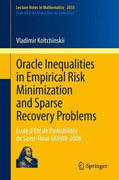
Oracle inequalities in empirical risk minimization and sparse recovery problems: Ecole d’Eté de Probabilités de Saint-FlourXXXVIII-2008
Koltchinskii, Vladimir
The purpose of these lecture notes is to provide an introduction to the general theory of empirical risk minimization with an emphasis on excess risk bounds and oracle inequalities in penalized problems. In recent years, there have been new developments in this area motivated by the study of new classes of methods in machine learning such as large margin classification methods (boosting, kernel machines). The main probabilistic tools involved in the analysis of these problems are concentration and deviation inequalities by Talagrand along with other methods of empirical processes theory (symmetrization inequalities,contraction inequality for Rademacher sums, entropy and generic chaining bounds). Sparse recovery based on l_1-type penalization and low rank matrix recovery based on the nuclear norm penalization are other active areas of research, where the main problems can be stated in the framework of penalized empirical risk minimization, and concentration inequalities and empirical processes tools have proved to be very useful. Provides a unified framework for machine learning problems (such as large margin classification), sparse recovery and low rank matrix problems Develops a variety of probabilistic inequalities for empirical processes needed to obtain error bounds in machine learning and sparse recovery Develops a comprehensive theory of excess risk bounds and oracle inequalities for penalized empirical risk minimization
- ISBN: 978-3-642-22146-0
- Editorial: Springer Berlin Heidelberg
- Encuadernacion: Rústica
- Páginas: 234
- Fecha Publicación: 30/09/2011
- Nº Volúmenes: 1
- Idioma: Inglés
